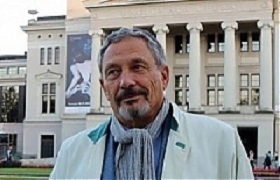Editor's note
International Internet Magazine. Baltic States news & analytics
Sunday, 21.12.2025, 09:25
New research directions for the Baltics
 Print version
Print version |
|---|
Under the constant pressures from the global and European
institutions, the states around the Baltic Sea area are adopting strategies,
which are changing almost completely traditional governance management goals and
science policies’ directions. Nowadays modern governance is about the states’
efforts towards reducing negative impacts on climate, promoting clean energy,
delivering on circular economy and sustainability issues. Such efforts are not
easy to make into practical political economy’s decision-making: some of these
issues have never been even heard about before; for example, clime change
targets entered the political agenda at the end of 2015 and sustainable
development goals, SDGs in 2016, to name a few.
Delivering on “green growth”
All the new and necessary changes in the Baltic States’
traditional political economy are summed-up presently under the “green growth”
strategies. Each country has its own way of implementing such strategies,
though some common approaches are evident too. For example, increasing the
share of renewables in the national energy mix and reducing imported oil and
gas shall be among common solutions. Over half of the needed fossil fuels are
imported in the EU-28; much of the energy mix in the Baltic States is still
covered by imported gas, coal and oil.
In this regard, climate and environmental goals coincide
with a positive effect on circular economy. Already by 2030, all new cars in
the EU shall be electro-cars, hybrid-vehicles or combination of both. Most of
the “transition” shall be financed from the EU budget.
If the EU states shall follow the Paris Climate Agreement of
2015, the European region shall be “climate-neutral” (i.e. without carbon
dioxide emissions, CO2) by 2050. None of the Baltic States have had such an
ambitious aim! Even Northern European states have different strategies, though
closer to the desired aim: Denmark plans to reduce CO2 gradually by 2030 with a
complete eradication by 2050; Germany has an intermediate goal by 2038.
In fact, the EU states can be fined for not implementing the
“2020 goals”.
New directions in science and research
Hence, a new and fruitful domain for science and research in
the energy sector: for example, in transport – developing “clean fuels” with a
zero-emission-effect, including hydrogen, synthetic liquids and synthetic
methane. In home heating appliances – a huge problem in the Baltic States
capitals, e.g. in Riga - some urgent measures shall be taken to either a
centralized or an electrified heating; the latter option is not that expensive
as it used to be…
Due to sharply plummeting costs of solar and wind power appliances during the last decade, a low-cost shift to a new clean energy sources in the Baltics is a real solution. Thus, the total costs of renewable energy systems (incl. transition and storage) are presently on par with fossil fuels. Generally, adequate technologies are already available in the world: it’s just a question of political will and national priorities. Thus, the lack of planning for renewable national alternatives in the Baltics and monopolistic interests still allow for continued subsidies to oil, gas and coal sectors.
Turning to green growth is the common Baltic States’
strategic endeavor: the governments can reach the desired goals only working
together: individual efforts are not any more enough. And the first step shall
be creating some new directions for science and research activities in these
countries, for example in the form of a Baltic “unified research strategy”.
Besides, some economic incentives shall be used too: e.g. all sorts of
polluting activities, both by public companies, households and private entities
emitting unlawful particles into air, water, soil, etc. shall be not only
forbidden but just expensive! Polluter-pays-principle shall be enforced
everywhere!
Thus, the general perspective is clear enough – changing the
existing mindsets; however, specifically the paths are the following: a) to
start educating civil servants and government officials; b) for financial and
corporate communities –urgently examining technically available approaches
(might be different in various states) to safe energy, sustainability and
perspective energy-food transformations.
Individual efforts in the Baltic States shall be combined with a common
Baltic strategy towards new science and research directions.











